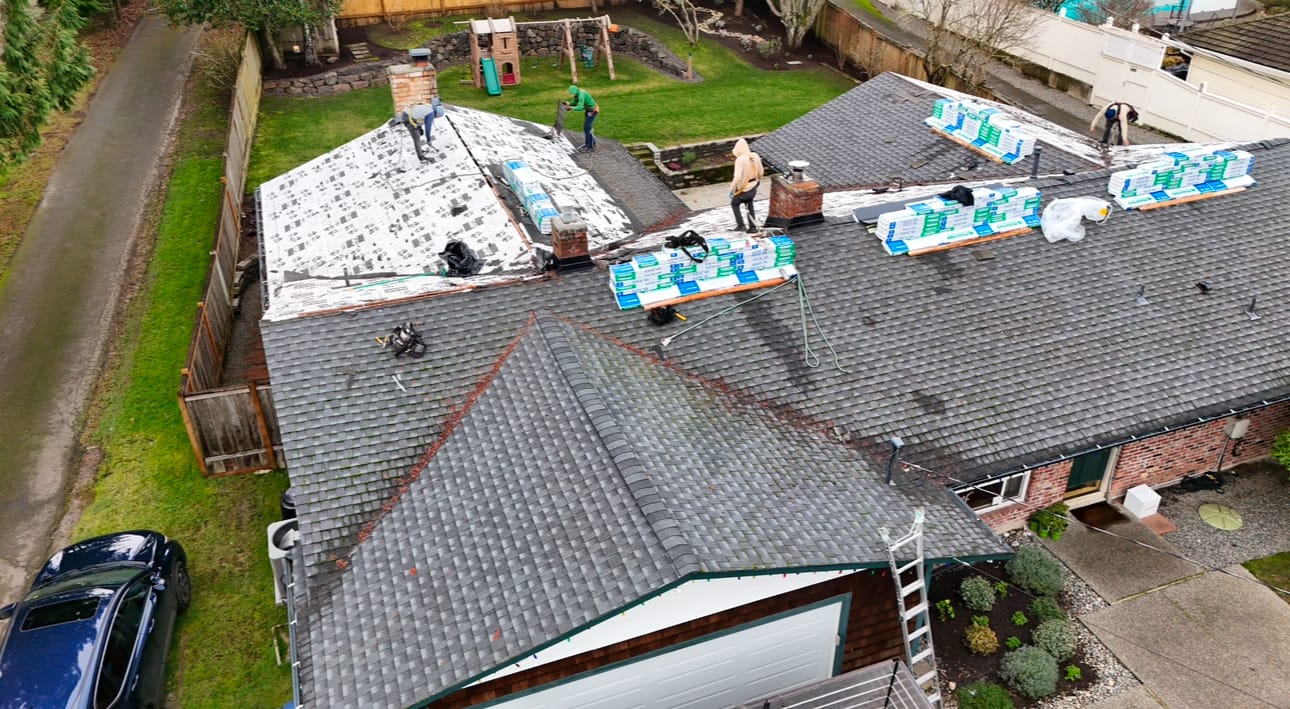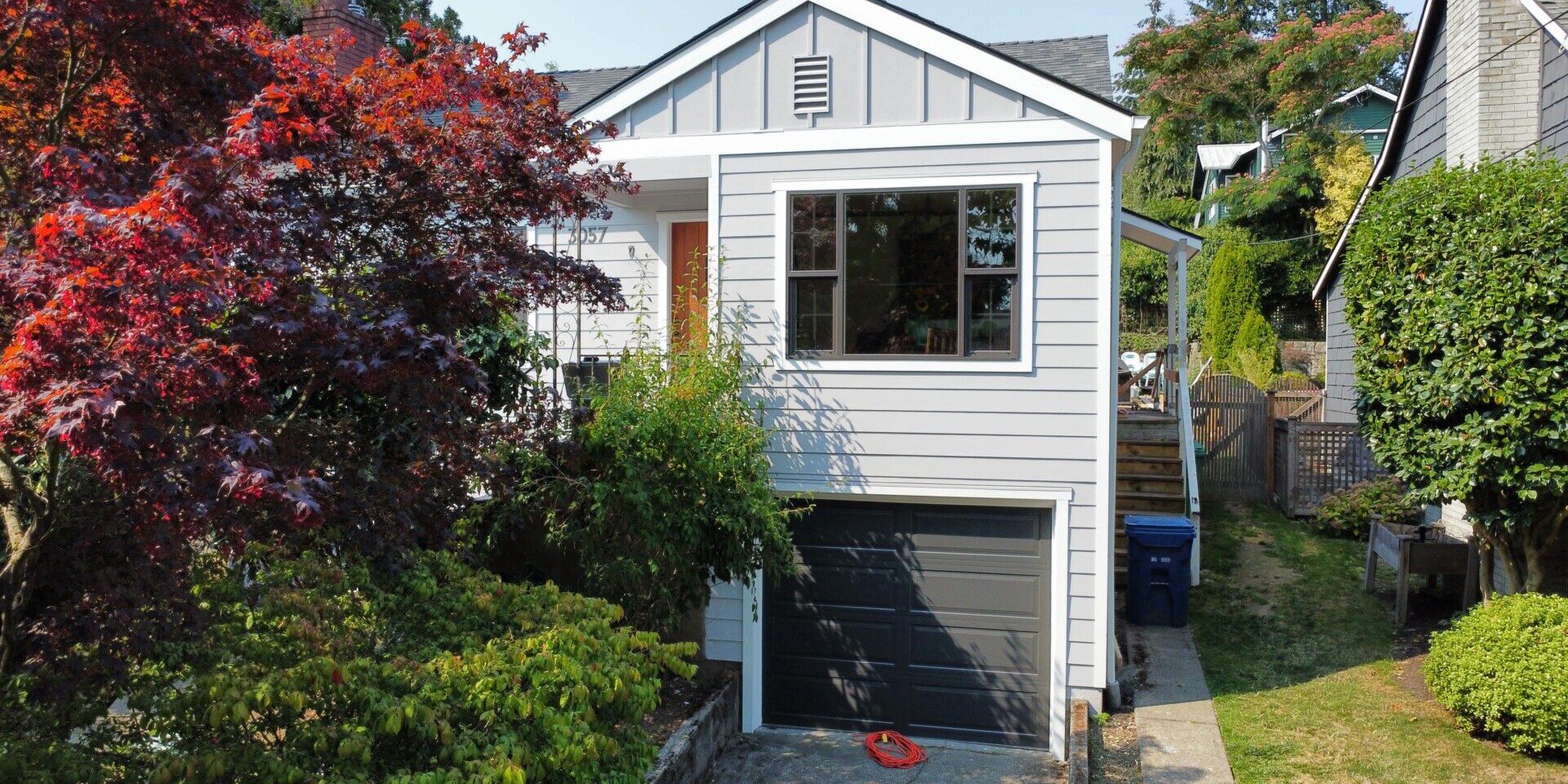How Much Does Roof Replacement Cost?
By K Single Corp Roofing & General Contractor
A reliable roof is one of the most critical investments you can make in your home. It safeguards your property from the elements, preserves structural integrity, and contributes to your personal style and resale value.
Yet one of the most common questions homeowners ask is, “How much does a roof replacement cost?” Unfortunately, the answer isn’t one-size-fits-all.
Costs vary widely based on a range of factors, from the type of roofing material you choose to the complexity of your roof’s design. Let’s break down the key elements that influence roof replacement costs and help you get a clearer picture of what you can expect.

7 Factors That Affect Roof Replacement Costs
1. Roof Size and Pitch
One of the most significant factors that affect the price of a roof replacement is the square footage. Larger roofs require more materials and labor, resulting in higher overall costs. The pitch, or steepness, of your roof also plays a role.
Steeper roofs can be more challenging, and potentially riskier, for contractors to work on, which can increase labor costs. In some cases, special safety equipment or additional time may be necessary, further driving up the price.
2. Material Selection
Roofing materials vary considerably in cost, lifespan, and aesthetics. For example, asphalt shingles are often more budget-friendly, while metal or slate roofs may require a bigger initial investment but offer greater durability.
Here’s a quick overview of common roofing materials:
- Asphalt shingles: Typically the most cost-effective and historically common option, with a lifespan of 20–30 years.
- Metal roofing: More expensive upfront but long-lasting, often 50 to 70 years or more.
- Flat roofing: Common in modern or commercial buildings, flat roofs can last 30 to 70 years. They can be economical but require careful installation and regular maintenance to avoid water pooling.
- Cedar shake roofing: A classic, rustic option made from natural wood. While it generally lasts 20 to 30 years, it requires more maintenance than other options and comes with a higher upfront cost.
Choosing the right material often means striking a balance between budget, aesthetics, and durability.
3. Tear-Off vs. Overlay
If you already have a roof in place, one decision you might face is whether to do a full tear-off or simply overlay a new roof on top of the existing one.
While a tear-off is usually more expensive because it involves removing the old roof and disposing of the debris, it allows roofers to inspect the underlying structure for hidden damage. An overlay can be cheaper initially, but any underlying problems remain unaddressed, which may cost more in the long run if issues arise later.
4. Regional Labor and Material Costs
Labor and material costs can vary widely depending on where you live. For example, urban areas often have higher labor rates, while rural regions might see increased material costs due to transportation and logistics. Local demand for roofing services, especially after storms, can also affect pricing.
5. Permits and Code Requirements
Most municipalities require permits for roof replacements. The cost of permits can vary from one area to another and may depend on factors like the home’s square footage or local building codes. If your roof project must meet additional requirements, such as higher wind or fire ratings, it can add to the overall expense.
6. Complex Roof Design
If your roof has a complex design, such as multiple peaks, dormers, or skylights, expect the cost to be higher. More intricate designs can make installation more time-consuming and require specialized materials. This added labor and material use will inevitably increase your total bill.
7. Extra Features and Upgrades
Some homeowners use the occasion of a roof replacement to upgrade their current system with additions like ventilation systems or new gutters. While these enhancements can improve your home’s performance and possibly save money in the long run, they do increase the upfront cost of the project.
Typical Cost Ranges
Costs can fluctuate based on the factors mentioned above, but here’s a general idea of what you might expect for different types of roofing materials, which include the cost of materials and labor:
- Asphalt shingles: Range from $350 to $550 per 100 square feet.
- Metal roofing: Ranges from $600 to $1,900+ per 100 square feet, depending on the type of metal and complexity.
- Flat roofing: Ranges from $350 to $600 per 100 square feet, depending on the membrane type and installation requirements.
- Cedar shake roofing: Ranges from $600 to $900 per 100 square feet, depending on the quality of wood and level of maintenance needed.
Keep in mind these numbers represent ballpark estimates. Your actual costs could be higher or lower based on local market conditions, the contractor’s expertise, and your home’s unique needs.
When evaluating roof replacement costs, it’s easy to fixate on the price tag. However, value is a broader concept that considers factors like longevity, durability, and potential energy savings. Spending more on a pricier roof upfront might lead to lower maintenance costs and a longer lifespan overtime.

Financing and Insurance Considerations
Roofers don’t expect you to have the money for a roof replacement up front. Luckily, there are options to help you afford this costly project.
Financing Options
Many homeowners explore financing for roof replacement through home equity loans, personal loans, or specialized roofing financing plans offered by contractors. Before choosing a financing route, think about interest rates, loan terms, and your own cash flow to ensure you’re making the right financial decision.
Insurance Coverage
If your roof has been damaged by a covered event, such as hail, wind, or a fallen tree, your homeowner’s insurance might cover all or part of the replacement. Review your policy and consult with your insurance provider to clarify what’s included.
Choosing the Right Roofing Contractor
A significant piece of the cost equation is the quality of workmanship. Hiring a reputable roofing contractor ensures your roof is installed correctly, preventing leaks, early failures, and potential structural issues. Look for a contractor with:
Look for a contractor with a proven track record in your area, valid licenses and insurance to protect both parties, and strong references from past clients. A reliable roofing professional should also provide a clear, itemized estimate that explains labor costs, materials, and any additional fees.
In Need of a Roof Replacement? Schedule Your FREE Estimate With K Single Corp Today
Contact K Single Corp for a FREE estimate. Our experienced team will assess your roof’s condition, discuss material options, and provide a transparent breakdown of costs. We’ll also answer any questions you may have about financing, insurance claims, or the installation process so you can make a well-informed decision.

